QuAADS Leadership
Karol Kowalski – Director
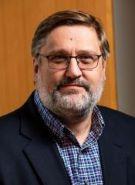
Karol Kowalski is an expert in advancing electronic structure methods and parallel algorithms for many-body methods as well as applying these formalisms to tackle complex chemical processes. Over the last seven years, he has been coordinating the development of NWChem computational chemistry software at PNNL. He has been recognized for several important contributions in coupled cluster (CC) theory, including renormalized CC theories, multi-reference formulations, and linear response methods. An important part of his research portfolio is associated with the development of scalable implementations of many-body formulations describing correlated behavior of electrons in molecular systems. In particular, he has developed implementations of quantum chemical methods capable of taking advantage of hundreds of thousands of processors with the concurrent utilization of various types of accelerators. Kowalski currently leads a Department of Energy, Basic Energy Sciences program Quantum Information Science project focused on enabling quantum computing for realistic chemical systems and processes.
Ang Li – Chief Scientist
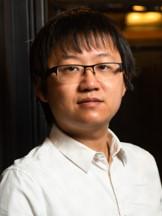
Ang Li is a senior computer scientist whose research has focused on software–hardware codesign for scalable heterogeneous high-performance computing, including graphics processing units, field-programmable gate arrays, coarse-grained reconfigurable arrays, artificial intelligence/machine learning accelerators, and quantum processors. His research covers the full-stack design from circuit level up to architecture, system, library, and applications.
Anne Chaka – Deputy Director

Dr. Anne Chaka is a senior research scientist in the Geochemistry group at PNNL, where she applies computational methods to understand quantum phenomena and chemistry in complex environments. Before coming to PNNL, she was leader of the Computational Chemistry group at the National Institute of Standards and Technology and head of Computational Chemistry and Physics at the Lubrizol Corporation.
Nathan Wiebe – Advanced Quantum Algorithms
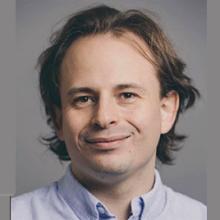
Nathan Wiebe is a researcher in quantum computing who focuses on quantum methods for machine learning and simulation of physical systems. His work has provided the first quantum algorithms for deep learning, least squares fitting, quantum simulations using linear combinations of unitaries, quantum Hamiltonian learning, near-optimal simulation of time-dependent physical systems, and efficient Bayesian phase estimation. He has also pioneered the use of particle filters for characterizing quantum devices, as well as many other contributions ranging from the foundations of thermodynamics to adiabatic quantum computing and quantum chemistry simulation. Wiebe currently holds a joint appointment in the High-Performance Computing group at PNNL and is an assistant professor of computer science at the University of Toronto. Wiebe also holds an affiliate professorship in the Department of Physics at the University of Washington.
Sam Stein – Architecture
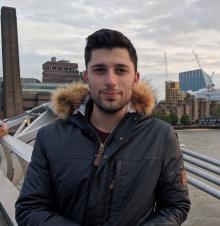
Sam Stein obtained his MS in data science from Fordham University in New York. His research focused on topics such as quantum deep learning, a quantum machine learning framework, and quantum generative adversarial networks. He joined Pacific Northwest National Laboratory in May 2021. Stein is a quantum algorithms and machine learning research associate, with a focus on traversing the noisy intermediate-scale quantum era through algorithm development.
Niri Govind – Quantum Chemistry

Niri Govind is a physicist whose expertise and research interests are in ground- and excited-state electronic structure theories; development for simulating, interpreting, and predicting X-ray spectroscopies; strong light–matter coupling in cavities; excited-state dynamics of complex chemical systems; embedding approaches to study ground- and excited-state properties of molecules and materials; and algorithms for quantum computing. He is a member of the core development team of the open-source NWChem computational chemistry program, which is developed and maintained at PNNL.
Johannes Muelmenstaedt – Nonlinear Transport

Johannes Muelmenstaedt’s main research focus is on the behavior of clouds in the multiscale climate system. In his current projects, Muelmenstaedt aims to use observations of process variables, rather than state variables, to evaluate and eventually improve general-circulation and cloud-resolving global climate models. He is also interested in brute-forcing multiscale classical physics problems with quantum computers.
Yousu Chen – Power Grid
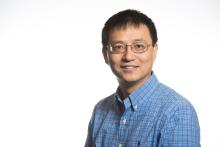
Yousu Chen is a distinguished chief electrical engineer at PNNL. His research focuses on applying advanced computing, data analytics, and artificial intelligence and machine learning to power grids. He is dedicated to enhancing power system reliability and security, as well as advancing operations, control, and decision support. As the manager of PNNL’s Advanced Grid Modeling program, Dr. Chen oversees the development of cutting-edge methodologies in advanced computing, modeling and simulation, mathematics, machine learning, and data analytics. His leadership is pivotal in developing innovative approaches at the intersection of technology and power system management, ensuring the grid’s ability to adapt to evolving challenges and opportunities.
Chenxu Liu – Quantum Software Tool Development

Chenxu Liu is a physicist whose research focuses on quantum optics and its application in designing quantum computing devices and control protocols, quantum communication using photonic graph states, entanglement purification and concentration, quantum algorithms applied to near-term quantum hardware, and quantum computing architecture design. He has led and participated in multiple research projects in quantum computing and quantum information processing.